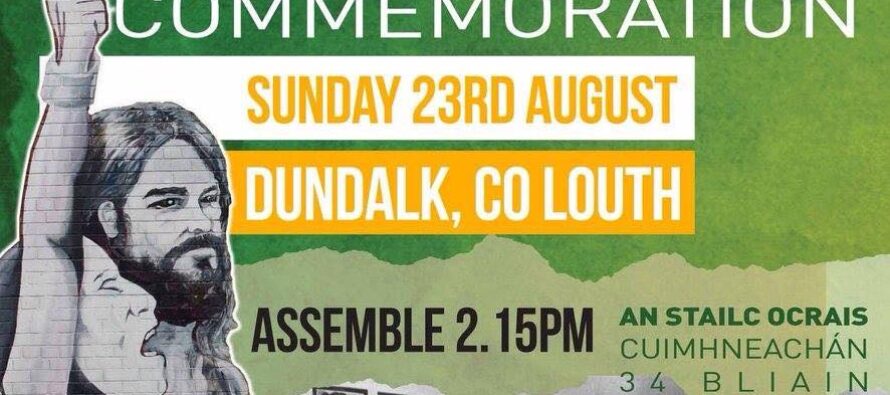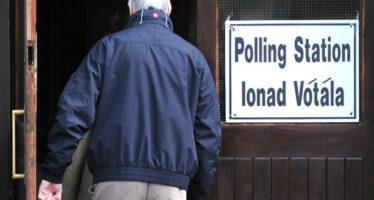Remembering the Hunger Strikers – National Commemoration Sunday August 23rd

![]()
National Hunger strike March is on Sunday August 23rd. Assemble 2.15pm Bailigh at 2.15 to walk to New Inn, Newry Road at 3pm1981 was a tumultuous period in modern Irish history and the 1981 hunger strike was a watershed moment from which all changed.Thursday was the 34th anniversary of the death of Mickey Devine, the last of the ten republican hunger strikers to die that year. The following day marked the 34th anniversary of the election of Owen Carron in the by-election in Fermanagh South Tyrone which followed the death of Bobby Sands. Tomorrow August 23rd Sinn Féin will hold the annual hunger strike march and rally in Dundalk. It is an occasion for remembering the 10 hunger strikers – as well as Frank Stagg and Michael Gaughan – and reflecting on their courage and selflessness. The elections which took place in 1981, including the June general election in the south which saw Kieran Doherty elected as a TD for Cavan Monaghan and Paddy Agnew elected for Louth – changed the shape of Irish politics. It also accelerated the debate within Sinn Féin on electoralism. The intervention of H Block and Armagh women candidates, in those and other constituencies, and the refusal of the Haughey government to support the prisoners, contributed at that time to the worst result for Fianna Fáil in 20 years.
Subsequently, Fine Gael and Labour entered into a coalition. From that point until this there has never been a single party government again.34 years ago none of us knewany of this. We were conscious of the history of hunger strike in Ireland and of the names of Thomas Ashe… Terence MacSwiney… Sean McCaughey… Michael Gaughan… Frank Stagg and others who had died on hunger strike. Bobby Sands and and his comrades knew that history also.In his prison diary on the first day of his hunger strike Bobby set the context for it all. He wrote: ‘I am dying not just to attempt to end the barbarity of H Block, or to gain the rightful recognition of a political prisoner, but primarily because what is lost in here is lost for the republic …’Though the hunger strikers lost their lives, the British government lost the battle of criminalisation. In the years since then Sinn Féin has succeeded in increasing popular support and political strength for our political objectives, including ending partition. We are about achieving fundamental political change and promoting the principles of equality and inclusiveness, and of a rights based society that are the heart of the Proclamation.Sinn Féin is for building the republic that “guarantees religious and civil liberty, equal rights and equal opportunities to all its citizens, and declares its resolve to pursue the happiness and prosperity of the whole nation and of all its parts, cherishing all the children of the nation equally”.Bobby Sands and Francie, Raymond, Patsy, Joe, Martin, Kevin, Kieran, Tom and Mickey were inspired by these words. They resonate through the poems and songs and writings of Bobby Sands. They are a promise to every citizen on this island that they will be treated as equals; will be free; can chose their representatives; educate their children; enjoy prosperity and provide for each other on the basis of equality.Writing on scraps of paper, with an infill of a biro pen he hid in his body, Bobby used the power of his words to rail against those who ignore injustice, and exploit and oppress working people.Writing in his prison diary on the 11thday of his hunger strike, and paraphrasing one of his heroes James Connolly, Bobby condemned those who ‘bubbling over with enthusiasm (or patriotism) for his country, who walks through the streets among his people, their degradation, poverty, and suffering, and who (for want of the right words) does nothing, is, in my mind, a fraud’.Bobby was right. Fianna Fáil, Fine Gael and to its shame Labour, have been in government in one guise or another for decades. Their tweedledee and tweedledum politics have failed. The political corruption and conservative politics that have dominated the southern political system have ensured, as the current homeless crisis highlights, the inability of the state to house all of it is citizens, or educate them adequately or equitably. In fact, in nearly every measure, in almost every facet of life and society – from healthcare, transport, economic development – the state has failed its citizens. Our collective responsibility as we are about to celebrate the centenary of the 1916 Easter Rising is to finish the work that the men and women of 1916 and of 1981. That means working to build the republic envisioned by the Proclamation and the leaders of that time but suited to the needs of the 21st century.
Related Articles
Sinn Féin launched Election Manifesto
![]()
Launching the 2016 Dáil election manifesto, Sinn Féin president Gerry Adams described it as a “Plan for change, a plan for a sustainable and fair recovery”
Agresión de Rusia a Ucrania: reacciones oficiales en América Latina
![]()
Los Estados de América Latina han condenado oficialmente el accionar de Rusia, realizado en abierta violación a varios principios básicos del derecho internacional público
Dorleta Urretabizkaya Loretxoa – Il fiorellino
![]()
Nola, zergatik eta zertarako jakin gabe, hezetasun eta iluntasunaren koba epeletik mundu hotz eta zaratatsu honetara ekarri zuten ostikada batez.




